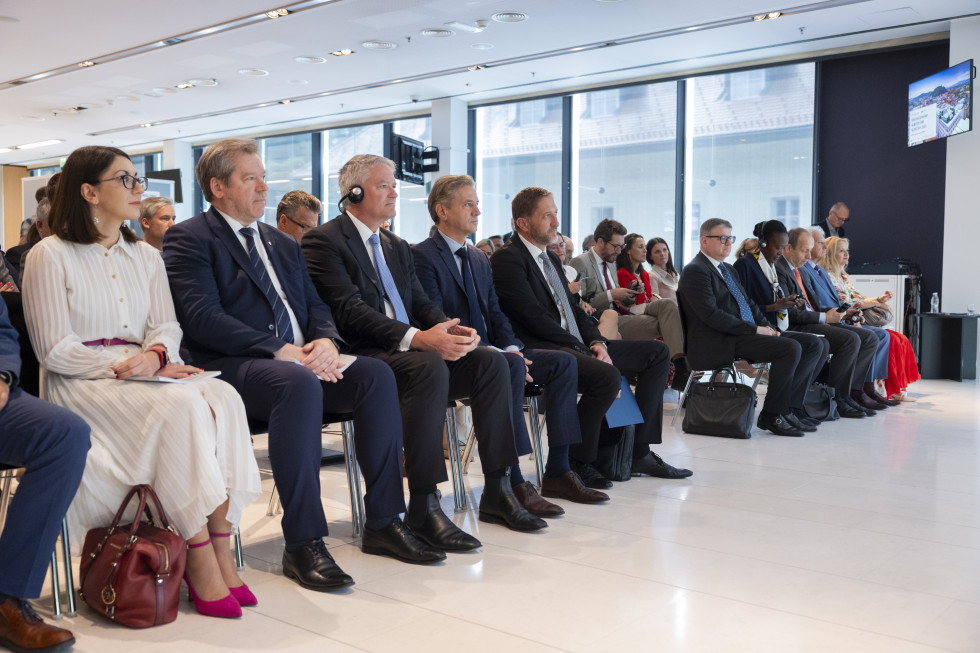At Brdo pri Kranju on the recommendations of the Organisation for Economic Co-operation and Development for Slovenia

Participants at the presentation of the Economic Survey for Slovenia | Author Bor Slana/STA
An introductory address by Prime Minister Robert Golob was delivered to the assembled guests. He recalled that Slovenia has made considerable progress in recent years and has successfully navigated interwoven global and regional crises. "We live in turbulent times, with multiple external and internal crises emerging one after another and populism dominating public discourse. This is precisely why the objective view that an institution as respected as the OECD can provide, is all the more necessary. When we were hit by the energy crisis in 2022, followed by the financial crisis, our initial response was to provide liquidity injections to energy companies. The funds were used efficiently, the energy companies are in good shape and the money has already been fully returned to the state budget. We implemented a similar measure in the area of borrowing, helping to create a liquidity buffer against the coming rise in interest rates. As a result, the cost of financing the national public debt has remained within the limits that we can cover efficiently. These two measures show that we can be a successful pillar of stability for the national economy also as a country", said Prime Minister Golob.
He added: "The OECD has been warning us for decades that Slovenia, as a small open economy, is facing major internal challenges due to the structural changes that are being announced, but are unfortunately not being implemented quickly. That is why, when our Government took office, we set out a reform agenda that is comprehensive in nature. I am convinced that the reform package is not only necessary, but is also something that will bring greater prosperity to our population in the long run. I am confident that the package we have set out will deliver results," concluded Prime Minister Golob.
At the event, OECD Secretary-General Mathias Cormann presented the findings and recommendations of this year's Economic Survey of Slovenia to the assembled guests. He believes that Slovenia is on the right track, pointing to the resilience of the Slovenian economy in recent years and the decline in inflation. The OECD recommends implementing appropriate structural measures to rebuild fiscal space to manage the costs of an ageing population. The OECD also sees scope for further progress in the green and digital transitions. This time, a special chapter of the Economic Survey was devoted to analysing and recommending changes in housing policy. On structural reforms, Mr Cormann aptly noted that "this is a marathon, not a sprint". He stressed the importance of taking the time to implement these reforms properly, so that the public understands the objectives being pursued. "It is the result that counts, not the speed," he said.
Minister of Finance Klemen Boštjančič thanked the OECD for its recommendations, noting that they will help address key challenges. He recalled that Slovenia had shown robustness and resilience in the face of recent crises, but recognised the need to address future challenges. These include addressing the growing pressure on public finances while ensuring continued growth and development, in particular by boosting productivity. "Our economic policy is focused on promoting growth and competitiveness," he said. He outlined some of the measures the Government is currently working on, including pension reform, the first package of tax changes, strengthening the capital market, promoting the green transition and tackling the challenges of housing policy.
The Minister also highlighted the challenge of planning and implementing fiscal policy – especially after the recent crises. He stressed the importance of balancing support for efficient investment with the growing needs in areas such as long-term care, social and health policies, while gradually achieving medium-term balance and stability in public finances. "It will be crucial to gradually consolidate public finances while maintaining investment in order to avoid hampering economic growth in the coming years, as happened in the aftermath of the financial crisis, particularly in Slovenia," the Minister stressed.

